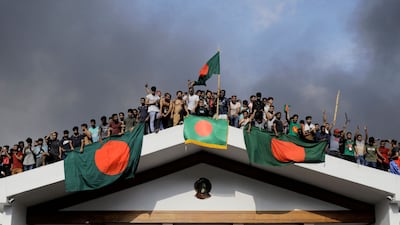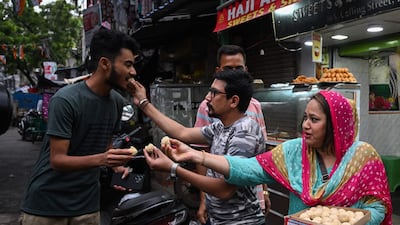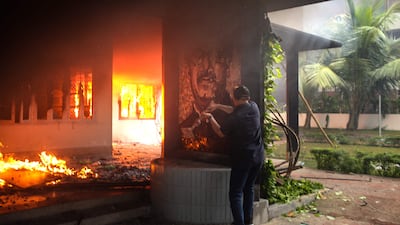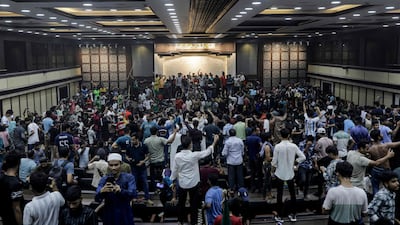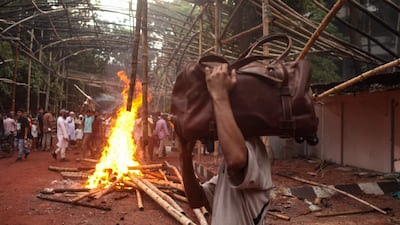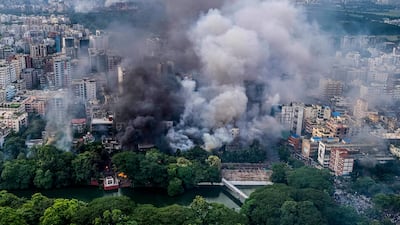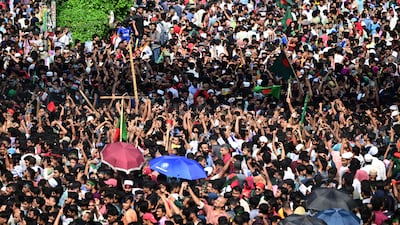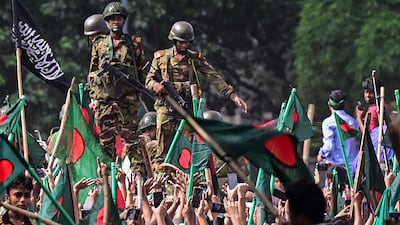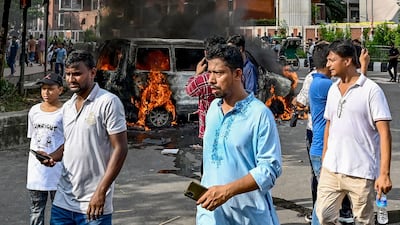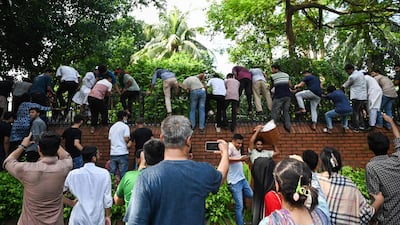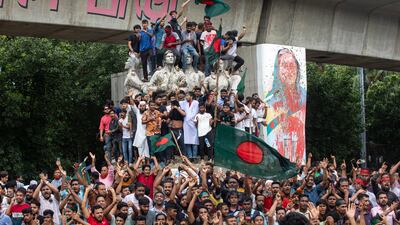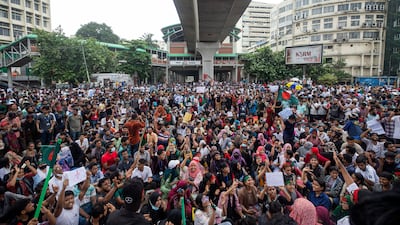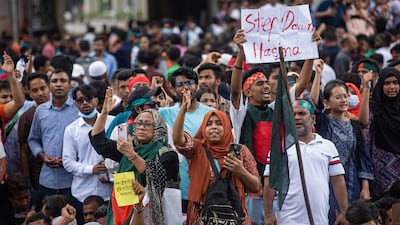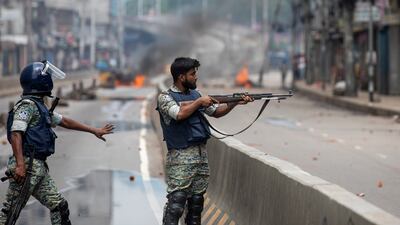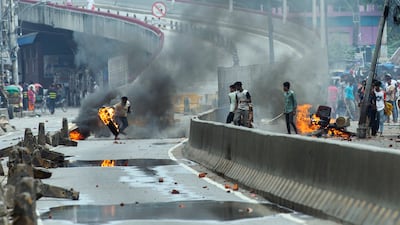Bangladesh's Prime Minister Sheikh Hasina on Monday resigned and fled the country after a day of unrest on Sunday in which about 100 people were killed.
Ms Hasina has reportedly landed in the Indian capital New Delhi, having fled the country after large crowds demanding her resignation stormed her residence in the capital Dhaka, after the worst outbreak of violence Bangladesh has seen since gaining independence in 1971.
The country has been on the brink since tens of thousands of students launched a countrywide movement in June against a government jobs quota.
More than 300 people have been killed in total since the protests began after security forces clamped down on demonstrators as the government imposed a communication blackout.
The government's heavy-handed tactics failed to stamp out the protests, which galvanised opposition to Ms Hasina, who has been in power for 15 years and is accused of ruling as an authoritarian.
On Monday, thousands stormed the presidential palace and were seen celebrating from within the residence.
Television footage broadcast by Bangladesh’s Channel 24 showed a helicopter carrying the 76-year-old prime minister away from the capital. Protesters waved to the camera in celebration and chanted “Ms Hasina has fled away”.
Ms Hasina’s helicopter landed at an Indian Air Force base in Ghaziabad near the Indian capital Delhi, according to reports in Indian media. India's National Security Adviser Ajit Doval reportedly met Sheikh Hasina at the airport.
It was not known if Ms Hasina would take refuge in India.
The Indian government, a close partner of Ms Hasina, has not commented on the developments. However, New Delhi has suspended all train services between India and Bangladesh while IndiGo Airlines has cancelled flights scheduled for tomorrow.
Army rule?
The Bangladesh Army had declared an interim government.
Bangladesh army chief Waker-Uz-Zaman announced Ms Hasina’s resignation soon after she fled the country and declared that an interim government would be formed, which he claimed would listen to the demands of the protesters.
“We will form an interim government and that interim government will run the country. We will go to the President … we will discuss all the issues, have faith in us,” Mr Zaman said.
“I am taking all the responsibility. I am giving my word for the safety of your life.
We will fulfil all your demands discuss all the issues and bring peace back to the country.”
The army chief urged the students to maintain calm and not to engage in “vandalism and violence” and said the curfew would be lifted.
“I am confident that if you listen to me and co-operate with me, we can bring peace … we cannot achieve anything with violence. Our country has been facing massive losses, there is loss to the economy, loss of life,” he said.
“Give us some time, we all together will find a solution. There is no need for any curfew.”
Dr Ishrat Hossain, a Bangladeshi researcher on Politics and International Relations at the University of Oxford, said she believed the army would eventually hand over power to a civilian administration.
“There is a very low appetite for an army-backed or an army-orchestrated government.”
“The discussion happening in Dhaka right now is that this should be a civilian government and the student leaders who have put their life at risk to bring this forward, their voices should be heard,” she said.
Celebrations
Ms Hasina’s resignation has sent a wave of celebration across Bangladesh.
Students and their parents gathered across Dhaka despite the rain, carrying flags and umbrellas.
“This is a decimation of a fascist. This was not an intentional movement, this was a protest against the quota scheme but this became a big movement … I want a country where we are free to choose and elect, and we have succeeded in achieving our goals,” Haseeb, one of the student leaders, told Channel 24.
Videos and images showed protesters climbing on the statue of Ms Hasina’s father and the founding leader of Bangladesh, Mujibur Rahman. Some were seen hitting it with a hammer.
Other videos emerged from within Ms Hasina's residence. People were also seen looting.
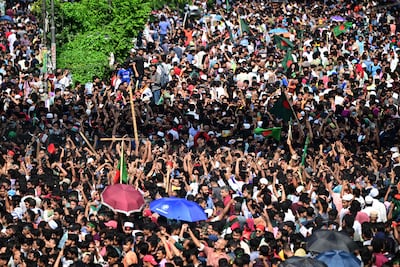
Dr Hossain said she was not “surprised” that Ms Hasina had fallen to mass protests. “This is how autocrats fall in most of the world, in all the uprisings that we have seen,” told The National.
“Given what had happened on Sunday, the kind of scenes we have seen on the streets where the ruling party members were attacking the protesters, there was a sense that this regime cannot go on for longer. I'm not super surprised that she had to leave. I'm just a bit surprised that it happened so quickly.”
At least 98 people were killed on Sunday, including 14 police officers, in the deadliest day of the unrest.
Sunday's violence raised the overall death toll from weeks of protests against quotas in government jobs to 300, according to a tally compiled by AFP.
No official death toll has been issued.
The military on Sunday had imposed an indefinite curfew and authorities cut off mobile internet in an attempt to stem further unrest, while roads leading to Ms Hasina's residence in Dhaka were closed off.
The demonstrations began in June against a quota that reserves 30 per cent of government jobs for relatives of war veterans, a move protesters say favours the ruling party.
Protesters and government supporters across the country have battled each other with sticks and knives, with security forces opening fire.
Ms Hasina had condemned the protesters as criminals and accused them of “sabotage”.
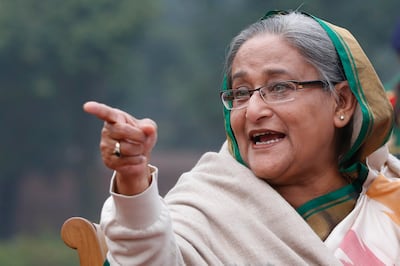
The quota system was scrapped by Ms Hasina’s government in 2018 after a student protest. The quotas were introduced in 1972 by Sheikh Mujibur Rahman who led his country’s fight for independence from Pakistan.
However, protests began in June this year, after the Bangladesh High Court reinstated the system of reserving 30 per cent of public sector jobs for relatives of veterans of the country’s independence war.
The move was overturned by the Supreme Court last month, which described the reinstatement as illegal and ruled that 93 per cent of jobs would now be allocated on merit while the remainder would be set aside for specific categories.
However, students demanded Ms Hasina’s resignation. She had ruled the country since 2009 and won her fifth consecutive term in January.
'Perfect storm'
The protests against the quota were fuelled by discontent with Ms Hasina's government's autocratic rule against the backdrop of an economic crisis.
While Ms Hasina has been largely credited for improving Bangladesh's economy and has worked on reducing poverty, the country has been struggling economically since the coronavirus pandemic.
Her government responded to the protests with draconian measures, banning public rallies and issuing “shoot-at-sight” orders for security forces. It also imposed a near-total internet and mobile blackout, bringing the entire country to a grinding halt.
“Since 2009 when Hasina came to power in a landslide [victory], since then, she has step-by-step totally eroded all the democratic institutions in Bangladesh,” Ms Hossain said.
“There has not been a fair election in the last 15 years, and there were three elections that were not fair. At the same time, there was a huge crackdown on all kinds of opposition.
“This shrinking space of dissent and any kind of freedom of expression and then the economy that kind of became extremely volatile with the reserves falling, the banking sector in a disarray.”
“All these factors kind of made a perfect storm and then the lid went off when the government brutally cracked down on the protesters in July, killing very young children and unarmed civilians like birds,” she said.
